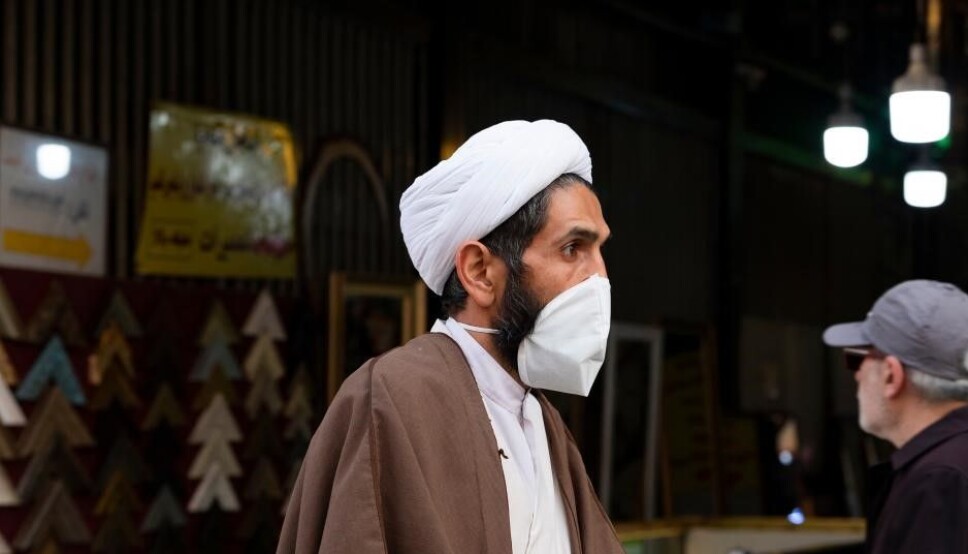Researchers' Zone:

Coronavirus puts world’s religions under pressure
Prayer assemblies are defying restrictions and spreading the virus — but faith may also be a coping strategy. Religious studies researcher discusses the role of religion in times of disasters and pandemics.
COVID-19 has made its mark on the world’s religions.
In Denmark, congregations have followed the government's call not to gather. The Church of Denmark has cancelled services and postponed confirmations, and mosques have cancelled Friday prayers.
Some priests are using other forms of media with online streaming, and the Swedish Church is encouraging the folding of hands in prayer followed by hand washing. St. Peter's Basilica in Rome remains empty, as does the Great Mosque of Mecca, and Buddhists around the world have closed temples and centres while calling for self-reflection, anti-corona meditation and 'mindful hand washing'.
But while religions contain many inbuilt elements that prepare for disaster, the corona pandemic puts their institutions under pressure in a multitude of ways.
And not all believers follow the advice and guidelines of science and health authorities.
'God's love keeps the believer healthy'
For some, religion is more important than government action in curbing health risks. The Greek Orthodox Church issued an official announcement that the virus is not transmitted via communion (the holy consumption of wine and bread).
American right-wing churches have reassured congregations that God is going to watch over us all. Some are ignoring the restrictions and insisting on letting Jesus' love flow through their bodies in warm embraces.
Muslim scholars are citing the Koran to 'overrule' assembly bans and point out that the Prophet went to mosque during disasters. In Bangladesh, tens of thousands are gathering for prayers, and in Pakistan hundreds of thousands of pilgrims have ignored the pandemic’s spread.
In Iran's holiest city, Qom, which has 20 million annual visitors, the virus has spread at an alarming rate. Priests have been quarantined and some have fled; but Allah watches over believers, according to several visitors.
YouTube-videos of dedicated believers who lick doors and gates at holy sites have gone viral.
A video of religious pilgrims licking door handles in Qom. (Video: MEMRI TV Videos)
An infectious virus and a religious regime resistant to open information and rational policy have proven to be a lethal cocktail.
Religion has always been ready for disaster
It is clear from all this that religions are under pressure. But religion is also a phenomenon that is prepared for disaster. Religion has always been prepared for, perhaps even based on, threats to life.
Death, evil and natural disasters have been met with meaning, prohibition and purification, although the latter has more symbolic than hygienic value. Religion provides cultural unity and fosters a communal sense of belonging.

In fact, for researchers such as Richard Dawkins, religion is itself a virus that, as a cultural gene (or 'meme'), spreads and 'infects' others. And from an evolutionary perspective, the group dynamics of religion are essential for survival.
Unity and community are the values of religions – but, in these times, they are also their challenges. Now we must stand together, but separately. Distance has become a buzzword.
The South Korean congregation of Shincheonji was (rightly) criticised for channelling the virus. Services bring together thousands of dedicated members, and sickness is no excuse to stay away. Much of the country’s infected appear to be members of the group.
Where does the disaster come from?
But where does the virus and other disasters come from? Religions have arsenals of different explanations here.
From an evolutionary perspective, it makes sense that we attribute human or divine power to ill fortune because then we can act on them and train our instincts. Having stories that you as a group can gather around provides unity in difficult times.
But there are also historical and cultural differences. In classical religion, the world was populated with gods and other supernatural forces. These could be negotiated with through prayers, sacrifices and amulets and rituals that ward off ill fortune.
The problem of evil (theodicé) was something one should basically leave to the gods. Natural disasters appear in religious myths as punishments from the gods.
Jehovah of the Old Testament became angry when the Israelites were disobedient, and he evoked all the suffering of the world onto his chosen people. The Nordic Ragnarok describes the destruction of nature, and the Book of Revelation tells of the coming doomsday that will separate the sheep from the goats.
The world religions (Buddhism, Christianity and Islam) involve the human being as a co-actor on another level. Ethics and morality become parameters of correct religious behaviour.
Sickness as punishment
For example, in the 14th century, the European plague was seen as God's punishment for people who acted with loose morals.
Indeed, divine punishment was the conclusion for many American Christians when AIDS arose in the 1980s.
Many ascribe the current corona epidemic to the same thing. In this vein, an ultra-orthodox Jewish priest believes that it is God’s punishment for improper gay pride parades.
When the 2011 tsunami hit Japan, several attributed it to the Shinto Gods' punishment for human arrogance, while some Buddhists explained the same disaster as accumulated negative karma.
Tokyo's mayor referred to heavenly punishment and nature’s forces responding to Japanese egoism.
When a tsunami hit Samoa in 2010, as a Norwegian anthropologist has shown, there were two main narratives.
The traditional church’s version stated it was God punishing people for not keeping the Sabbath holy at the beach hotels, while the new Christian groups saw the disaster as a sign of Christ's return.
Finding a scapegoat
The unifying strategy of attributing misfortune to outside forces was studied by the philosopher René Girard, who developed the theory of the scapegoat mechanism.
According to Girard, it makes sense to pass on a people's concerns to the gods, with whom they can subsequently negotiate. Warding off evil by demonising it as Satan's work sets the scene for backing the right horse in the cosmic drama.
That strategy also seems to work on a human level. Trump still insists on calling COVID-19 ‘the Chinese virus’, and a Tunisian priest explains it as Allah’s punishment for the Chinese for what they have done to the country’s Muslim minorities.
An evangelical preacher has proclaimed, possibly inspired by Trump, that the virus is a satanic plot to sneak socialism into the country.
An evangelical preacher, Perry Stone, believes that COVID-19 is a demonic attack to kill older Christian people so that socialism can spread in the country. (Video: Right Wing Watch)
And in India, a Hindu nationalist guru has proclaimed that it is an avatar, a deity, who has inhabited the virus to punish meat eaters.
Religious coping
Religions have explanation models that can act as coping strategies for the religious.
Some researchers even believe that there is a link between religiosity and dealing with crises and trauma.
Several studies suggest that the religious seem to get through these crises better with 'positive religious coping'. Some even believe that faith itself can be healing; or at least can be a positive tool for getting through suffering.
Others point out that disasters can lead to an increase in religiosity, and that people exposed to suffering are more religious than others. Accordingly, the number of religious Americans should have increased significantly after 9/11, at least briefly.
Studies also show that the religious United States stands ready for disaster. In 2010, 4 out of 10 Americans believed that Jesus would return by the year 2050. COVID-19 is, for some, a sign of the impending judgement day.
A preacher has reassured everyone, however, that it will disappear because, in the name of Jesus, he has made it illegal.
God's protection creates indifference to the problem
However, religion as a positive coping mechanism has also faced criticism.
Often, research has focused on Western, empirical methods based on Christian or ancient religious understandings - or even with religious undertones. Other studies show that religiosity has no effect whatsoever, or that it can even have negative consequences.
Low risk expectation can, for example, lead to fatalism or a belief in fate and destiny. This can also be seen in the United States, where Christians on the right are not overly concerned about the spread of viruses, because both Trump and God provide protection and security.
The more religious, the lower the fear seems to be of disasters and epidemics; for fear can also be a sign of a lack of faith.
Where was God when the plague hit?
Disasters have, conversely, also led to religious criticism and less religion.
When the plague spread around Europe during the 14th century, prayer and penance were natural responses to God's wrath, but critical questions gradually arose. Where was God?
Some believe that criticism of the church’s power and impotence helped to light the way for the later Reformation, just as the great earthquake in Lisbon in 1755 helped to reinforce the Enlightenment thinkers’ religious critiques and, in the longer term, modernity's ‘disenchantment' of the world.
The tsunamis in South-East Asia and Japan also led people to ask critical questions about the relevance of religions.
Today, in a modern, enlightened society, we typically refer to science-based, naturalistic explanations. Natural disasters and climate change with extreme weather conditions are not divine punishments but rather natural reactions to imbalances created by humans (and other factors).
We also know that it is the most economically and politically disadvantaged who suffer the most, and that disasters are rarely democratic.
Religions have disaster rituals
Rituals are a typical way to act in crisis situations. Priests and shamans can ward off or protect against external dangers, and, on behalf of the people, they can negotiate with the gods or interpret prophecies. As a human being, you can pray, sacrifice, pay for your sins or change your way of life.
In India, Hindus have gathered to worship the virus avatar and dispel the infection by collectively paying for the sin of some people eating meat. The guru encouraged the drinking of cow urine and the eating of cow pats.
In India, Hindus drink cow urine. The logic is based on the prevalent magical notion that by ritually ingesting part (the urine) of the whole (the holy cow), one absorbs the sacred power of the latter. (Video: South China Morning Post)
The logic is based on the prevalent magical notion that by ritually ingesting part (the urine) of the whole (the holy cow), one absorbs the sacred power of the latter.
Japanese religion is prepared for disaster in multiple ways with amulets, rituals and religious narratives, and at Shinto shrines you can now buy personalised plates to protect yourself against COVID-19.
Good sales in doomsday prophecies
But religions also resort to their organisational relevance, as in the 2011 tsunami. Here, many different religions contributed with emergency help and aid; even to such an extent that they still benefit from a positive image.
Religions have the economic and trust-based resources that can be valuable in crises. When Christians in the second century helped in an epidemic in Rome, it may even have aided the spread of the religion.
During the Ebola epidemic in West Africa, the relief work of the religions was important in terms of crisis and emergency help, education and general logistics.
However, religions have also used disasters strategically for their own gain. Doomsday prophecies are marketable stories, and natural disasters are obvious opportunities to exploit for their missions.
After the Tsunami in Sri Lanka, American missionaries were ready with relief packages, Bibles and conversion stories. There will certainly be a market for both doomsday stories and missions in response to the COVID-19 epidemic.
Corona strikes at the heart of religions
Already now, COVID-19 appears to be a disaster on such a huge scale that its effects will be felt for a very long time. Economically, politically and socially, it will lead to major problems and new ways of thinking, and it will have consequences in the world of religions too.
Some will legitimately be able to link it to climate change and our way of understanding and living life in its light. We now have hard, concrete evidence that everything is connected, and both critics of globalisation and holistic animists will each have their arguments for rethinking life values.
The virus strikes right into the heart of religions, for religions are about communities and group dynamics, and, ultimately, how can you meet for rituals all by yourself?
Religions will certainly invent new disaster models for new times of crisis. Pilgrimage must be rethought, as must the economy and relevance of holy sites.
For the academic study of religion, there are new challenges within a much investigated but far from depleted field of research.
How do people understand crises, disasters and epidemics with or without the use of religion? How do you act and cope, and how do religions respond? What values will we see in light of COVID-19, and what are the differences between religions and degrees of religiosity?
Hopefully, future research of religion will make us more aware of these and many other issues.
Translated by Stuart Pethick.
Read this article in Danish at our Danish sister site Forskerzonen.
References:
Jørn Borups profile (AU)
'The role of religion in local perceptions of disasters: the case of post-tsunami religious and social change in Samoa'. Environmental Hazards (2019). DOI: 10.1080/17477891.2018.1546664
'Religious coping'. Longitudinal Aging Study Amsterdam (opdateret 2019).
'Post September 11 Attitudes'. Pew Research Center (2001).
'Jesus Christ’s Return to Earth'. Pew Research Center (2010).
'Religious and Spiritual Responses to 9/11: Evidence from the Add Health Study'. Sociological Spectrum (2011). DOI: 10.1080/02732170802206047
'Religion and Ebola: learning from experience'. The Lancet (2015). DOI: 10.1016/S0140-6736(15)61082-0






